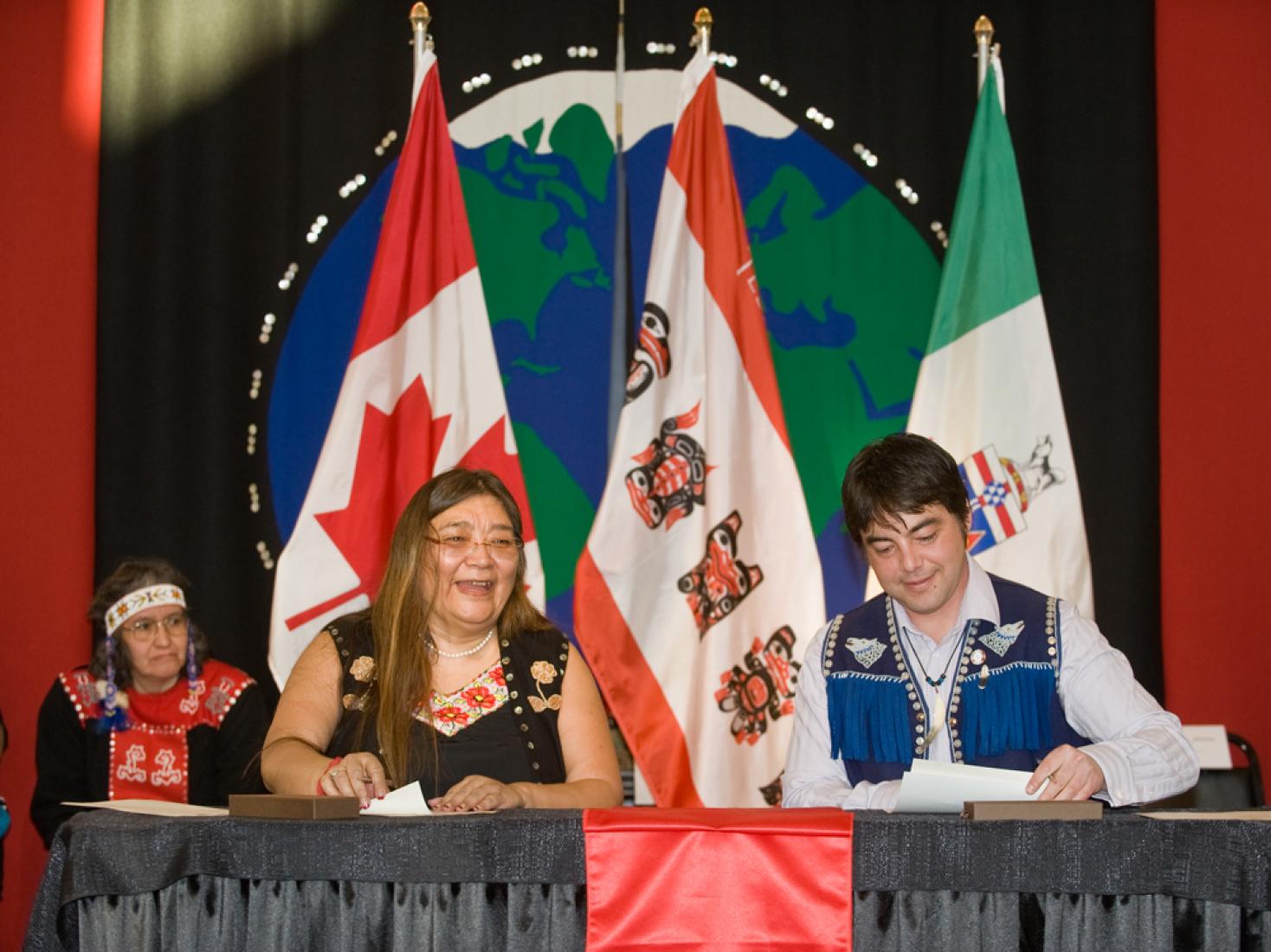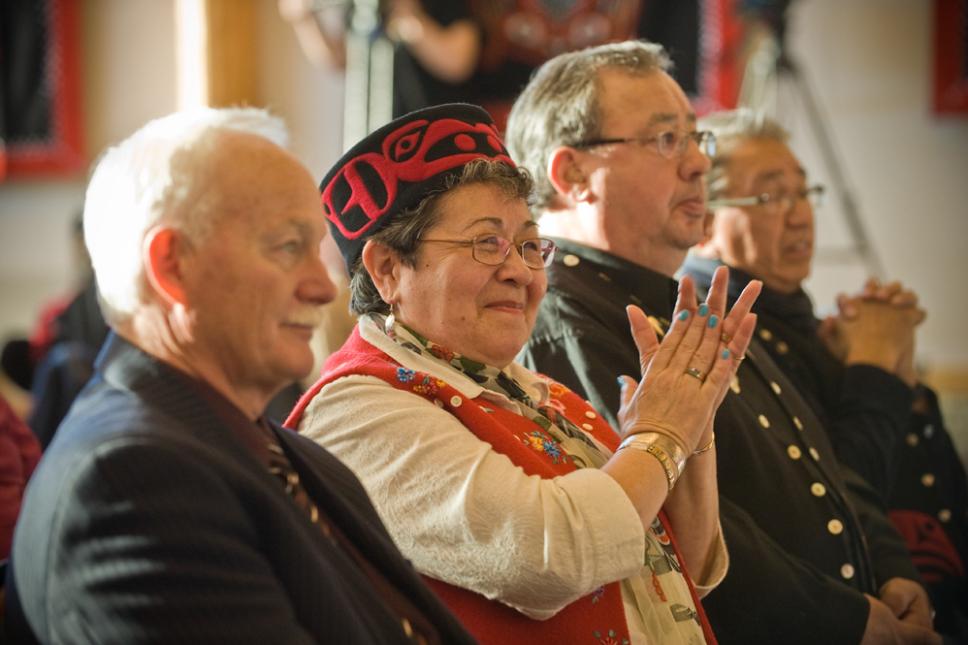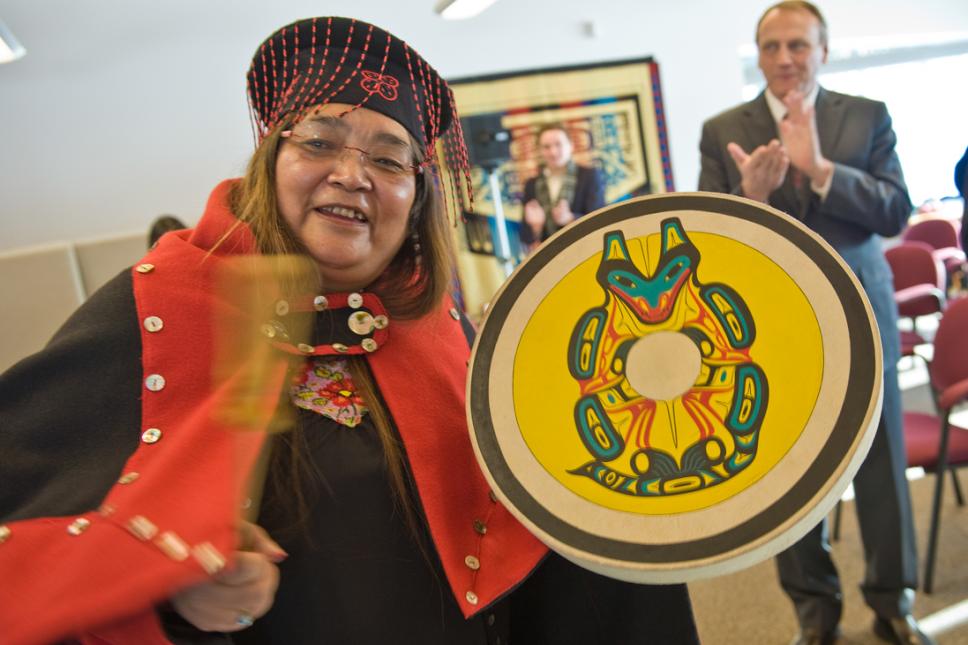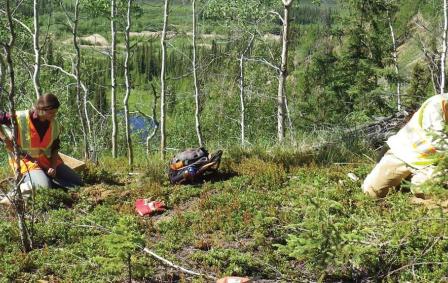Teslin Tlingit Council Peacemaker Court

Restoring the Balance - Teslin Tlingit Council Peacemaker Court is changing the way we think about Justice
Facing your community and your Elders is the hardest thing a person can do when they have done wrong.
Providing a way to be accountable to your community, your clan and your people is one part of the work that the Teslin Tlingit Council (TTC) Justice Council does. The Teslin Tlingit model of justice puts a focus on restorative justice -- which is meant to strengthen the community rather than dividing it.
Melaina Sheldon, a Teslin Tlingit citizen and member of the five-person Justice Council, says that TTC’s vision of a new way of thinking about justice is slowly taking shape.
“It’s not easy work to look at yourself, to address your own hurt, where your hurt comes from and why you hurt someone else because of it. To come back to your community, to face the person you hurt and their entire family; that takes a really big person,” she says.
Haa Ḵusteeyí
The Teslin Tlingit Justice Council and Peacemaker Court promote resolution of disputes and honours Haa Ḵusteeyí, or Teslin Tlingit Law. Haa Ḵusteeyí roughly translates to “the way we live” and it promotes respect, honour and integrity for all living things.
It’s an overarching, holistic way of living.
"We say it’s something you have from birth, it’s having integrity, it’s being honest. I often say if we were living 100 per cent Haa Ḵusteeyí - if every person was conducting themselves in this proper way that we’ve inherited from our ancestors which is to be respectful towards each other, to do your best, to not steal, to share, to be generous - we wouldn’t need Justice Council," says Sheldon.
Ultimately, says Sheldon, the Peacemaker Court aims to use “our values, our beliefs and our principles to resolve disputes and to promote healing.”
It’s hard to infuse laws and western thinking with these inherent knowings and feelings, but we’re trying,” she adds.
Administration of Justice
The Teslin Tlingit Council signed an Administration of Justice Agreement with the governments of Yukon and Canada on February 21, 2011. This agreement was brought about through the justice provisions of the Self-Government Agreement.
Following the signing of the Administration of Justice Agreement, the Teslin Tlingit Council passed the Peacemaker Court and Justice Council Act that established the Peacemaker Court and outlined the composition and powers of the Justice Council.
What is Justice? It is our way of living for each individual. Our justice system is our way of life (Haa Ḵusteeyí). We are proud people. Tlingit Law was truth and honesty. We need to have that back again. We also need to love and understand one another.
These guiding principles inform the work of the Teslin Tlingit Justice Council, which is made up of representatives of the five clans.

The work the Council varies from appointing Chief Peacemakers and Associate Peacemakers, to making recommendations to the Chief Peacemaker and Associate Peacemakers, and working in a spirit of fairness together. The first Justice Council members were appointed in 2012. In April 2014, the Justice Council appointed the Chief Peacemaker.
Teslin Tlingit Council is the first Yukon First Nation with an Administration of Justice Agreement.
It’s important because part of being self-governing is that you can discipline yourself and discipline those within your territories.
This includes protecting Settlement Land and making sure visitors and guests know they must abide by Teslin Tlingit Council laws when they are on Teslin Tlingit Council land.
The Agreements speak to reconciliation and provide a means for governments to work together.
“We still have a lot to learn from each other, and First Nations still have a lot to teach... because our justice system will focus on the individual and community structures,” says Sheldon.
“The governments need to work together, she says. “We need each other. We can’t go forward without each other. We can’t have a better and stronger Canada without each other and without that relationship,” she says.

Vision for the Future
Although the Peacemaker Court is not yet fully operational, once it is up and running there will be mediation and adjudication services that will hear matters in the community.
Once the Peacemaker Court is fully operational, it would have the jurisdiction to hear offenses under all Teslin Tlingit laws, regardless of a person's citizenship status. However, one difference is that a penalty can’t be imposed on a non-Citizen that is ‘different in nature’ from those generally imposed by territorial, provincial, or superior courts in Canada without the person's consent.
Any Teslin Tlingit citizen or Teslin community member will be able to request mediation under the Peacemaker Court, as long as those involved agree to the process.
That process could consist of the Chief Peacemaker or an Associate Peacemaker going back and forth between people or clans until a plan to move forward is worked out – and balance is restored.
That is how our community stays connected to each other.
In the future, Teslin Tlingit Council imagines a justice building where the Peacemaker Court would take place, as well as enforcement of TTC laws and talking to youth about possible future careers in TTC justice. “It’s not only ground-breaking for us as a self-governing First Nation, but it’s also ground-breaking for Canada. One day I hope to see people that can have an option and say ‘no, I’d like to take this to restorative justice or a tribal court,” she says.



